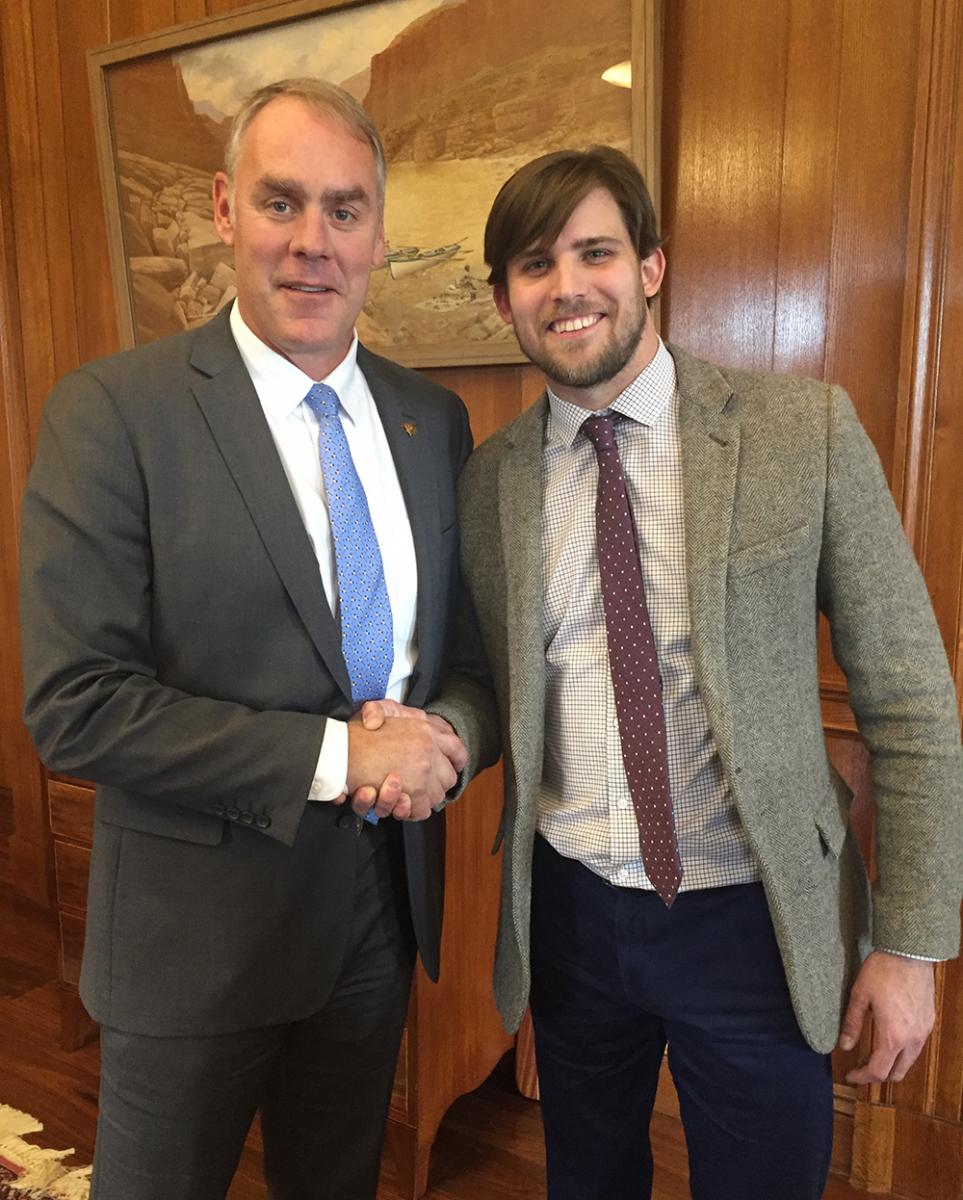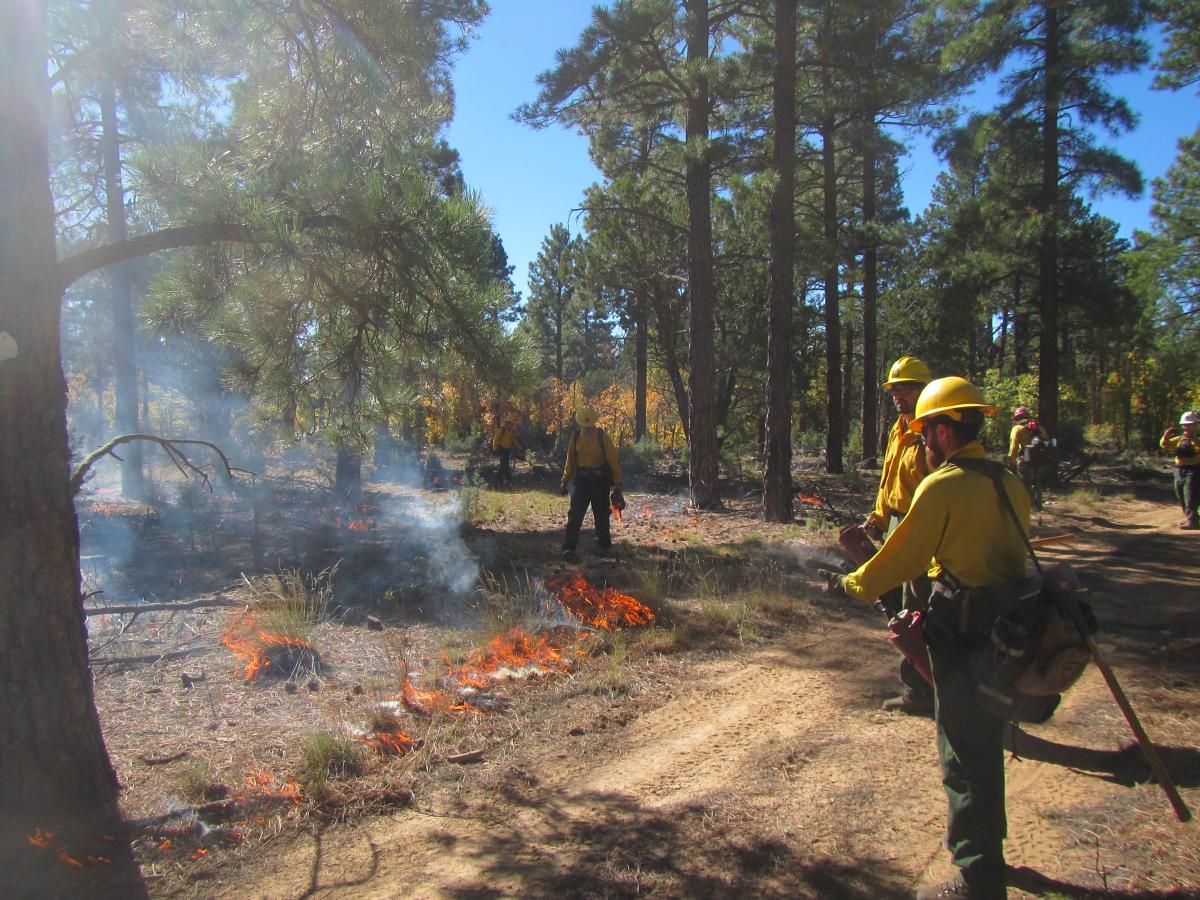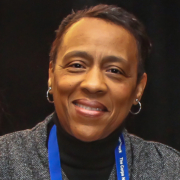
Learn more about Veterans Conservation Corps in Veterans Service and Conservation Corps: Career Pathways through Continued Service, a publication of The Corps Network (November 2017).
By Joshua Tuohy, Government Relations Coordinator at The Corps Network
(pictured below with U.S. Secretary of the Interior Ryan Zinke)
 Military veterans representing all branches of service gathered in Washington, DC last week to join the Pew Charitable Trusts’ Restore America’s Parks campaign in advocating for ways to address the infrastructure needs of our national parks.
Military veterans representing all branches of service gathered in Washington, DC last week to join the Pew Charitable Trusts’ Restore America’s Parks campaign in advocating for ways to address the infrastructure needs of our national parks.
The connection between veterans and parks might not immediately be obvious, but there is a strong bond. The individuals who came to Washington don’t just identify as veterans; they are hunters, anglers, hikers, kayakers, wildlife photographers, and outdoor enthusiasts who found renewed meaning and peace in their lives through the Great Outdoors.
About a third of all national parks commemorate and interpret military history, including 25 battlefields and 14 national cemeteries. Some of these parks manage decommissioned forts and bases that once trained our military and protected our country. These 156 sites document and educate future generations, yet they account for nearly half of the National Park Service’s more than $11 billion in deferred maintenance.
For two days last week, veterans voiced their concerns to 25 Members of Congress on issues ranging from the accessibility of parks for those with disabilities, to underfunded infrastructure maintenance and ways to enhance the visitor experience. The efforts reached a high point with a candid roundtable discussion convened by Interior Secretary Ryan Zinke, himself a former Navy SEAL. I applaud the Secretary for his strong support for increased engagement of veterans and military families on public lands, and his commitment to veterans at the Department of the Interior. I am encouraged that we have a veteran at the position of Secretary overseeing our public lands.
I am a six-year U.S. Army infantry veteran. I’ve always loved the outdoors; some of my fondest memories are of hiking and snowshoeing through Mt. Rainier National Park while stationed at Ft. Lewis, WA. Places like this would play an integral role in my recovery after a roadside bomb took the lives of three of my comrades and my leg in Afghanistan in 2009. I’d eventually find myself standing on the literal edge of the South Rim of the Grand Canyon, taking off my leg to cliff dive into Crater Lake. I’d once again meander through the fog in the elevation of Mt. Rainier. These moments fostered necessary self-assurance and forged new conviction. It was only out there that I rediscovered a virtue I had previously known in the military: that I am connected to something far greater than myself.
The importance of our public lands and national parks to veterans cannot be understated. They offer an opportunity for catharsis for the wounded and those seeking new adventure and a sense of belonging. Such experiences are so important to the transition process from service member to civilian – a process without any defined timeline or blueprint.
One way to ensure more veterans benefit from time in the Great Outdoors and have an opportunity to continue their mission of service to country is through Veterans Corps. Veterans Corps are locally-based programs that connect veterans to parks and the outdoors by giving them the opportunity to train for careers in resource management through national service and AmeriCorps projects conserving our public lands and forests. Many former service members experience a lack of purpose, lack of civilian job confidence, and lack of peer support. Service in Veterans Corps offers an opportunity to purge these notions, renew a sense of purpose and mission, and author a new chapter in life.
Since 2009, Veterans Corps across the country have engaged former military in projects ranging from invasive species removal and the preservation of historic properties, to trails restoration and wildfire management. Many of these projects take place at national parks, forests and refuges and help reduce the maintenance backlog. All while engaging former military members in quality mission-driven and skills-based service and apprenticeship programs.

Veterans Fire Corps members with Conservation Legacy
The Corps model benefits veterans in a range of ways: it provides a similar structure and sense of purpose as the military; offers the therapeutic benefits of getting outdoors and working with fellow veterans; and helps participants re-acclimate to civilian life through skills development and other supportive services. In a 2016 survey, 90 percent of Veterans Corps alumni surveyed indicated that Corps opportunities helped them transition from the military.
Veterans Corps are part of a larger Corps movement – the 21st Century Conservation Service Corps: a national initiative, through public-private partnerships, to spread the word about modern-day Corps and annually engage 100,000 young adults and veterans in AmeriCorps and national service to strengthen our infrastructure, rural and urban communities, and public lands.
21CSC is part of a solution to fixing the maintenance issues faced by our resource management agencies. With their talents, commitment to service, and passion for the outdoors, recent veterans are a critical element.
Let us, as a nation, continue to support our public lands with the kind of zeal we put into supporting our veterans. Let us support the engagement of veterans in the Great Outdoors. Let us recognize the values we display when we properly manage our public lands, as well as the values we demonstrate when we let parks, and our sense of service to others, fall into disrepair.
Veterans Corps can answer the call for a new mission. Let us hope our lawmakers and leadership answer our calls to address deferred maintenance and support veterans, and citizens generally, in restoring our parks and public lands. As a nation, let us all value service to America’s lands and communities.
Learn more about Veterans Conservation Corps in Veterans Service and Conservation Corps: Career Pathways through Continued Service, a publication of The Corps Network (November 2017).


































































